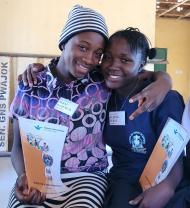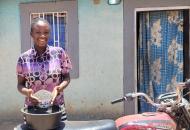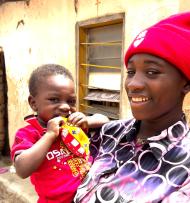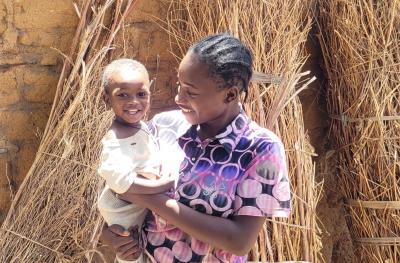
When we first met Nerat Dabwol in early 2024, she was a 15-year-old from a rural village in Vwang district in Plateau State in Nigeria who had been forcefully married, had a baby, and was forced to drop out of school. Pressured by marriage, household responsibilities, and caring for her child, Nerat’s dreams of becoming a naval officer seemed unrealistic.
At the time of our first story, we were preparing to launch the Adolescent Girls Program later that year in Nigeria. Nerat had just heard about the program from her grandfather and was eager to participate. The program focuses on equipping young girls with essential skills, increasing their knowledge about health and rights, and creating a safe space for them to interact and express themselves. We featured Nerat’s story in our #SheDares Campaign. You can read about her: My Name Is Nerat: I Dare to Take Control of My Future
After seven months, we connected with Nerat again, and she shared how her life has transformed:
In October 2024, I joined the Women for Women International Adolescent Girls program with 50 other girls. This moment proved my life wasn't over, and I could rewrite my story. I learned what it means to be a teenager, as society had pushed me into womanhood too soon. The program reminded me that I have a right to grow, dream, and make my own choices.
I’ve learned about the negative effects of alcohol and substance abuse on young people, particularly how it can hinder brain development. This knowledge helped me talk to a friend struggling with drug use, and she has since made positive changes in her life.
I have learned about sexual and reproductive health rights, as well as the risks associated with dangerous sexual behavior—a topic that is often considered taboo in my community. This knowledge has encouraged me to make informed choices about my health. I have also understood the importance of proper nutrition for myself and my family. With my parents' support, I make sure we have nutritious meals. I often help my mother with cooking or prepare meals on my own, focusing on incorporating more fruits and vegetables into our diet.
The business training sessions inspired me to start a staple food business that I am confident will thrive in my community. This venture will boost my resources and help me become self-sufficient. I now realize my strengths and right to take charge of my life and future.
Most importantly, my parents have supported me throughout the training. They have attended several community and safeguarding meetings with the program teams, which has gradually shifted their perspective on education and supporting girls.
With the monthly stipends I receive from the program, along with some assistance from my mother, I have started a sesame seed business at home, and it is generating some profit. Additionally, I joined a Village Savings and Loan Association (VSLA) group where I save money with my friends.
As a young mother, I want my son, Bright, to have a better life than I did and dream of him becoming a banker. Before I had started the program, I didn’t think I’d ever want to go back to school to complete my education. But now, I plan to return to school in September so I can be a strong role model for Bright.
Upon completing secondary school, I will go to university to achieve my goal of becoming a naval officer. With my father promising to take care of my school fees, I, in turn, am also committed to ensuring my son enrolls in school.
Slowly but surely, I feel I can take back control of my life and transform not only my future but that of my son’s as well.



